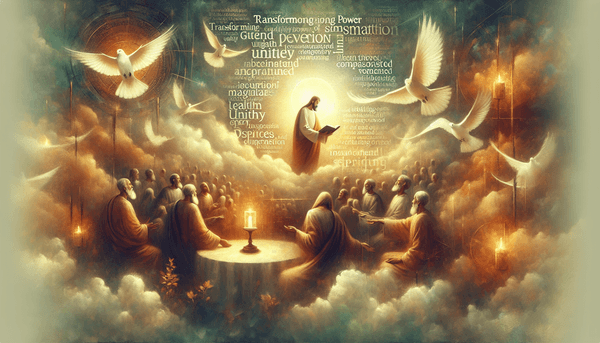The Healing Touch of Faith
In Matthew 9:20-34, we encounter a series of miraculous events that underscore Jesus’ healing power and His responsiveness to faith. A woman, beleaguered by twelve years of incessant bleeding, reaches out to touch Jesus’ cloak with the conviction that this simple act would restore her to health. Her faith is met with Jesus’ approval and her instant healing, as He declares, 'Take heart, daughter,' he said, 'your faith has healed you.' And the woman was healed at that moment (Matthew 9:22). This pivotal moment is followed by Jesus’ visit to a synagogue leader’s home, where He brings a young girl back from the jaws of death, showcasing His dominion over life itself (Matthew 9:25). Yet, the chapter does not conclude there; two blind men are granted sight, a miracle that provokes skepticism and accusations from the Pharisees, who claim Jesus casts out demons by the prince of demons (Matthew 9:30-34). Despite this, Jesus emphasizes the kingdom of God and the urgency for workers in the spiritual harvest, reminding us of the profound connection between faith and the readiness to serve.
Jesus Calls and Dines with Sinners
The Gospel of Matthew continues to depict Jesus’ inclusive ministry in Matthew 9:9-13. Jesus extends an invitation to Matthew, a tax collector, a profession scorned by many for its association with extortion and collaboration with Roman occupiers. By calling Matthew to follow Him, Jesus demonstrates His willingness to embrace those on the fringes of society. Moreover, Jesus’ choice to dine with tax collectors and sinners at Matthew’s house further illustrates His mission to reach the lost and offer redemption. His response to the Pharisees’ criticism underscores His purpose: 'It is not the healthy who need a doctor, but the sick... For I have not come to call the righteous, but sinners' (Matthew 9:12-13). This encounter reiterates the theme of mercy over sacrifice, a concept rooted in Hebrew scripture, as seen in Hosea 6:6, and emphasizes the paramount importance of compassion over mere ritual observance.
The Unity and Purity of the Church
The first letter to the Corinthians serves as a testament to the challenges and responsibilities of early Christians, and by extension, believers today. Paul’s epistle is a clarion call to unity, urging the Corinthians to overcome divisions and to be 'perfectly united in mind and thought' (1 Corinthians 1:10). He navigates through delicate issues such as immorality, lawsuits among believers, and chaotic worship practices, advocating for a church that exemplifies holiness and order. Paul emphasizes the significance of love, which should underpin the use of spiritual gifts, stating that without love, even the most eloquent of tongues is reduced to a meaningless clamor (1 Corinthians 13:1-3). The apostle also reminds the faithful of their collective identity as God’s temple, a sacred space for the Holy Spirit, and therefore, a community called to live in purity and righteousness (1 Corinthians 3:16; 6:19-20). In doing so, he lays the foundation for a unified church committed to serving the Lord with steadfastness and zeal (1 Corinthians 15:58). To delve deeper into the role of the Holy Spirit and our identity in Christ, consider exploring this related article.






